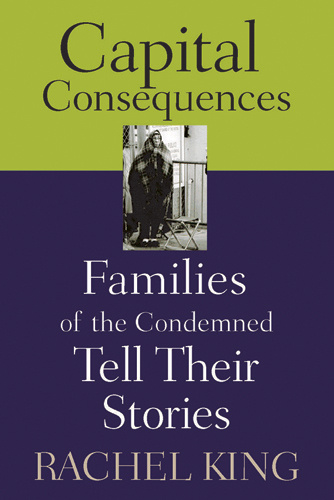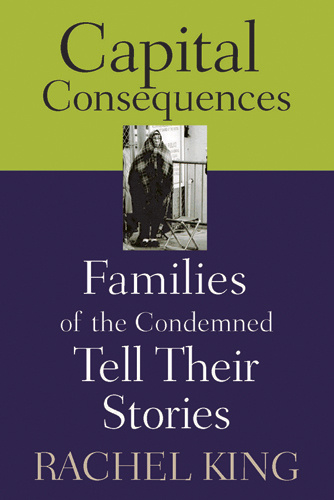Our shopping cart is currently down. To place an order, please contact our distributor, UTP Distribution, directly at utpbooks@utpress.utoronto.ca.
Capital Consequences
Families of the Condemned Tell Their Stories
Those who support capital punishment often claim that they do so because it provides justice and closure for the victims’ families. In Capital Consequences, attorney Rachel King reminds us that there are other families and other victims who must be considered in the debate over the death penalty.
Combining a narrative voice with vivid, passionate, and painful accounts of the families of death row inmates, the book demonstrates that crimes that lead to death sentences also devastate the families of those convicted. These families, King argues, are the unseen victims of capital punishment.
King challenges readers to question the morality of a punishment that victimizes families of the condemned and ripples out through future generations. Chapters tell the stories of families that have lost life savings supporting an accused loved one, endured intense public scrutiny, been subjected to harassment by the media, and are struggling to live with the inhumane treatment that their loved ones receive on death row. The author also explores the unique nature of the grief that these families suffer. Because their pain tends to elicit less attention and empathy than that of the crime victims’ families, King shows how it becomes much more desperate and isolating.
On a human level, this book is a powerful reminder that tragic events have tragic consequences that far outreach their immediate victims. At the same time, the accounts illustrate many of the flaws inherent in the judicial system—racial and economic bias, incompetent counsel, prosecutorial misconduct, the execution of juveniles, and wrongful convictions, some of which are only now being overturned because of recent advances in DNA technology.
Regardless of which side of the death penalty issue you are on, this book will lead you to pause and consider that all acts—criminal and retributive—have broader human implications than we are sometimes willing to realize.
Mothers everywhere weep for lost sons, and children everywhere long for absent parents, but the families of those on Death Row suffer without sympathy or comfort. In Capital Consequences, King thoughtfully describes the anguish of these families as an execution date draws near and challenges the belief that creating another saddened and grieving family is a legitimate consequence of the death penalty.
There are few, if any, books like the one Ms. King has written. I hope that people will not turn away from the hardness of these accounts, but will take them in and respond accordingly.
It could happen to anyone
A hero's life
Living with death
Revenge to reconciliation
Too young to die
A mother's love
A regular guy
A reasonable doubt
Beyond grief





